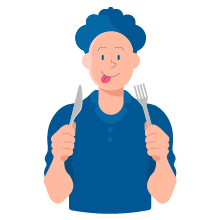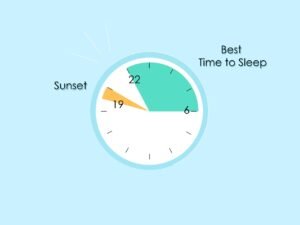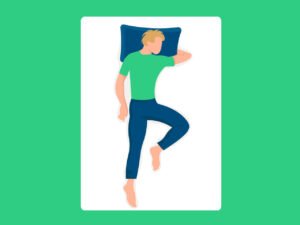
How you sleep at night depends on what you eat during the day.
Nutritional research has helped us to gain a better understanding of how our diet affects our overall health, such as how we sleep.
If you’re looking to stay energetic throughout the day, and especially if you’re trying to sleep well consistently, it’s important to understand more about the foods that make you sleepy.
Contents
What Nutrients Aid Sleep?
The foods that make you sleepy are riche in sleep-inducing nutrients that will help you to achieve a deep sleep.
Here are some of those nutrients:
- Gamma-aminobutyric acid (GABA)– GABA helps to increase alpha brain waves, associated with relaxation and helps you to calm you so you can fall asleep more easily. GABA is also associated with reducing anxiety and improving immunity, both impediments to getting a good night’s sleep.[1]
- Potassium – plays an important role in regulating the REM intensity and duration of sleep,[2] and proper potassium levels can improve sleep efficiency.[3] Low Potassium levels, or hypokalemia, are among the possible causes of muscle cramping that can also interfere with your sleep.[4]
- Magnesium – plays an essential role in leading to greater relaxation.[5] Among the mechanisms that Magnesium facilitates is the activation of protein receptors responsible for regulating levels of GABA;[6] Magnesium can help to reduce the symptoms of mild to moderate Restless Leg Syndrome that interfere with sleep.[7]
- Zinc – A critical component in overall immunity. Zinc helps to regulate a variety of enzymatic processes and nervous system functioning to improve overall sleep.[8]
- Melatonin – Melatonin is considered to be the “sleep-promoting hormone” for its role in helping to regulate each individual’s circadian rhythm responsible for controlling when you are awake and when you should go to sleep.[9]
- Tryptophan – Tryptophan is among the 8 essential amino acids and one that your body uses to create serotonin which is then converted to melatonin, helping to induce sleep.[10]
- Vitamin B6 – This vitamin plays a key role in the process of converting tryptophan into serotonin, helping to improve sleep and dream quality.[11]
- Serotonin – A neurotransmitter that serves to help regulate mood and promote positive cognitive functioning while also serving as a precursor in the production of melatonin.[12] Given the role that Serotonin plays in mood and sleep regulation, low Serotonin concentrations are linked with the onset of depression and insomnia.[13]
- Folate – Also known as B-12, Folate is crucial for melatonin production because it facilitates the transition from intermediary compounds to melatonin. Folate deficiency was shown to dramatically decrease melatonin production in rats, suggesting a similar response in humans.[14]
Combining these different elements and compounds generally improves their sleep-inducing effects.
When melatonin, magnesium, and zinc were provided as simultaneous supplements consumed in the evening, they were found to make falling asleep easier, improve sleep quality, and increase alertness in the morning.[15]
Top 10 Foods that Make You Sleepy
Knowing which compounds lead to sleep can help you narrow down the foods that make you sleepy so you can know what are the best foods to achieve a deep sleep.
Almonds
Almonds contain 1.2ng melatonin per gram,[16] providing a natural source of this sleep-inducing hormone.
Another helpful sleep-inducing attribute is that a serving of almonds contains approximately 20% of the daily recommended amount of magnesium, a necessary component for overall relaxation and sleep quality.
In one study, researchers found that almond extract has a sedative effect similar to the artificial sedative phenobarbital, suggesting that it may be an effective therapy with regard to insomnia.[17]
Consuming almonds and the diversity of sleep-inducing phytochemicals they contain are a recommended pre-bedtime snack.
Almonds can be enjoyed in a variety of forms, though enjoying them shelled and roasted is the most convenient and flavorful means for a sleep-facilitating food.
You can also almonds as a butter. It’s not as tasty as peanut butter, but many people love the taste of almond butter.
Pistachios
As helpful for sleeping as almonds are, they are not the most powerful nut sleep-aid.
Pistachios are considered one of the best foods that make you sleepy because they contain twice the concentrations of natural melatonin as almonds;[18]
Some sources suggest that a gram of pistachios can contain up to 660 nanograms of melatonin,[19] much more than other foods, including other nuts.

Beyond being a rich source of melatonin, pistachios contain a variety of other sleep-inducing nutrients. A serving of pistachios contains the following:[20]
- Magnesium – 40mg (~10% of the daily recommended amount).
- Potassium – 338mg (~10% of the daily recommended amount).
- Vitamin B6 – 0.6 mg (~33% of the daily recommended amount).
- Folate – 17 mcg (~4% of the daily recommended amount).
- Melatonin – 99ng
- Tryptophan – 38mg (~11% of the daily recommended amount)
Regularly consuming pistachios, even as a small snack after your last meal or at least an hour before bedtime, will provide you with an abundance of the nutrients necessary for quality sleep.
Although many find pistachios to be a nice complement to beer, consuming alcohol too close to bedtime can actually interfere with sleep.[21]
If you like your pistachios salted, pair them with warm milk or tea for a complete pre-bedtime snack. You can also enjoy them unsalted for maximal nutritive value!
Some people may find pistachios to have a more pungent or bitter flavor.
If that is the case, soaking pistachios before eating will help them increase in flavor and nutrition.[22] Soaking will also help to remove excess salt and make them taste much creamier.
Peeling pistachios before soaking is an important step to ensure that they are properly saturated and their flavor is not tainted.
As with any snack but especially pistachios, don’t overconsume them because they are high in calories.
Walnuts
Continuing the trend, Walnuts are another great option for an ingredient that will help you fall asleep.
Walnuts have been shown to be another food source rich in melatonin and which helps to increase blood melatonin levels after consumption.[23]
In addition to being a rich source of melatonin, walnuts contain an abundance of other components necessary for proper sleep:
- ~15% of the magnesium daily recommended dose (63mg),
- ~4% of the potassium daily recommended dose (176mg)
- ~10% of the folate daily recommended dose (39mcg)
- ~5% of the vitamin b6 daily recommended dose (39mcg)
- ~60% of the tryptophan daily recommended dose (318mg)
- 150ng of melatonin[24]
Another benefit to consuming walnuts is that they are rich in protein and dietary fiber, which increase fullness and prevent you from feeling hungry while you are sleeping.[25]
Walnuts contain alpha-linolenic acid, or ALA fatty acids, which our body can convert to DHA or docosahexaenoic acid.
DHA has been linked to increased serotonin production,[26] which our body can convert into melatonin at night.
If you find the taste of walnuts unappealing, you can mix them with other ingredients in a smoothie to enjoy a nutritious blend.
You can also try making walnut parsley pesto:
If you want to make this pesto even healthier, try the following techniques:
- Use a food processor for more efficient blending.
- Use a whole, fresh avocado for a rich source of healthy fats and fiber
- Replace salt with a spoon of miso paste for some beneficial microbes.
Brazil nuts
One of Brazil nuts’ benefits is that they are rich in a variety of minerals and vitamins, especially selenium.
Selenium deficiency has been shown to cause sleep difficulties.[27]
A single Brazil nut contains about 68-91 mcg of selenium, another important ingredient in melatonin production.[28]
You don’t need to eat a lot of Brazil nuts to enjoy their effects on sleep. One or two per day is a great natural dietary supplement for a good night’s sleep.
Like other nuts, you can soak them for 6 hours in water if you don’t like their flavor.
The water will absorb all the biologically active substances that cause their bitterness.
Brazil nuts also become much easier to chew and swallow after soaking.
Omega 3
Foods such as fish and flaxseed are rich sources of Omega-3 fatty acids,[29] which are important components of a healthy, balanced, sleep-sustaining diet.
A study conducted by the University of Oxford showed that consumption of omega-3 could help in improving sleep.[30]
Studies have also demonstrated that the main omega-3 fatty acids, EPA, or eicosapentaenoic acid, and DHA, the omega-3 fatty acids found in fish, are significantly degraded by heat, even at 50 C.[31]
The omega-3 fatty acid in chia seeds and flax seeds is rich in ALA and has better heat stability than EPA and DHA, providing better sleep-inducing properties.
However, our body needs EPA and DHA and it can convert only a small percentage of ALA to EPA and DHA.
Therefore, to get the most sleep enhancement out of Omega-3 consumption, you should consume 15-20 grams of flaxseeds that were soaked overnight.
You can add these to a smoothie or any other uncooked breakfast dish, and you can supplement EPA and DHA from algae oil.
White rice
White rice is another powerful dietary sleep aid.
White rice has a high glycemic index (GI) value, leading to a larger rise in blood glucose after consumption.
Usually, it is not recommended to eat many high carb foods with high GI level.
However, researchers found in a study that eating a high-GI carbohydrate-based meal 4 hours before going to sleep can help you fall asleep 8.5 minutes faster than eating a low-GI meal.[32]
In a large study with 1,848 participants, rice consumption was associated with good sleep.[33]
There are many other sleep-inducing nutrients found in rice. In 100 grams of cooked white rice you will find:
- Magnesium – 12mg (~3% of the daily recommended amount).
- Vitamin B6 – 0.1 mg (~7% of the daily recommended amount).
- Tryptophan – 31mg (~10% of the daily recommended amount)
- Folate – 55 mcg (~14% of the daily recommended amount)[34]
Enjoy white rice as a part of a balanced diet to help you fall sleep quickly.
Sweet potatoes
Sweet potatoes are another carbohydrate rich food source that also provides a high source of the vitamins and minerals necessary for proper sleep.
Sleep inducing nutrients in a medium sized sweet potato:
- Magnesium – 40mg (~10% of the daily-recommended amount).
- Potassium – 740mg (~26% of the daily-recommended amount).
- Vitamin B6 – 0.4 mg (~25% of the daily-recommended amount).
- Tryptophan – 38mg (~11% of the daily recommended amount)[35]
Another benefit of sweet potatoes is that they are low in fat.
While there are fatty acids, such as Omega-3, that help with sleep quality, fat-rich foods can actually decrease sleep quality. Fat-rich foods might harm your sleep because:
- They cause the lower esophageal sphincter muscles to relax, which triggers the release of stomach acid traveling into the esophagus. Therefore, they increase the risk of acidic reflux at night.[36]
- They slow down the process of emptying your stomach, creating a sense of fullness that can keep you awake and which can also increase the risk of acidic reflux when lying in bed.
Sweet potatoes are a rich source of fiber that makes you feel fuller longer and reduces the likelihood that you will awaken during the night because of hunger.
Carbohydrates are an important component of tryptophan digestion and melatonin synthesis.[37]
Sweet potatoes provide sleep-promoting complex carbohydrates that make it easier for the tryptophan to reach the brain to be converted to serotonin.
Oatmeal
Oatmeal is another source of quality, complex carbohydrates that can help you fall asleep.
The sleep-inducing nutrients in a cup of oatmeal include:
- Magnesium – 221mg (~53% of the daily-recommended amount).
- Potassium – 536mg (~13% of the daily-recommended amount).
- Vitamin B6 – 0.15 mg (~8% of the daily-recommended amount).
- Folate – 70 mcg (~16% of the daily-recommended amount).
- Melatonin – 11,325ng[38]
- Tryptophan – 335mg (~80% of the daily recommended amount)
Consuming oatmeal can create an insulin spike which may make you feel drowsy.
If you’re looking for a wholesome bed-time snack, you can combine your oatmeal with bananas, a rich source of potassium, to maximize the sleep-causing nutrients available.
Hummus
Now a popular snack food or complement to a vegetarian meal, hummus is a a great food for quality sleep.
Hummus contains the following sleep-inducing nutrients in a cup of cooked hummus:[39]
- Magnesium – 73mg (~17% of the daily-recommended amount).
- Potassium – 442mg (~10% of the daily-recommended amount).
- Vitamin B6 – 0.2 mg (~11% of the daily-recommended amount).
- Folate – 261 mcg (~65% of the daily-recommended amount).
- Tryptophan – 130mg (~32% of the daily recommended amount)
Hummus is another food source that is rich in fiber.
Because it makes you feel full, it reduces the chances that hunger will bother you in the middle of the night.
Honey
Honey is a great natural sweetener with a variety of healthful properties that help you enjoy a quality sleep cycle.
The sugars in honey, similar to other carbohydrates, cause a spike in insulin levels which makes it easier for tryptophan to enter the brain.
Honey can also act as a natural treatment for nocturnal cough and sleeping issues associated with childhood upper respiratory tract infections.[40]
Honey causes glucose to be converted to glycogen[41] which gets released by the liver while you sleep and helps your brain to properly function while you are sleeping.
To enjoy the sleep-inducing benefits of honey, try 10 grams ( a spoonful) of honey) 30 minutes before going to bed to improve your sleep quality.
Fruits
Given the nutritive properties of fruits, it’s not surprising that there are a variety of fruits that can help you fall and stay asleep.
The best fruits to help you sleep are:
- Kiwis– have been shown to be a helpful sleep aid due to their rich source of carbohydrates, magnesium, and fiber [42]
- Bananas – help induce sleep given their abundance of potassium and fiber as well as their ability to stimulate melatonin production[43]
- Tart cherries – tart cherries are one of the highest sources of melatonin among all foods, especially fruits[44]
- Pineapples and Orange have a similar effect to bananas in their ability to stimulate higher concentrations of melatonin in the blood.[45]
View this post on Instagram
What Food To Avoid Before Sleep
In some instances, it would be better not to consume some meals before resting.
Those dishes are usually hard to digest, make your nervous system too excitable, or produce many toxins that make an unhealthy impact on the gut microflora.
Generally, it would be best if you did not eat lots of food before sleep, which may, for example, lower the risk of gastric reflux at night.[46]
Here are the top foods you want to avoid before going to sleep:
Meats
Various types of meats, especially those with lots of fats, are not digested in less than 12 – 48 hours.
The period of active stomach digestion of a standard portion of red meat is about 6 – 8 hours.
While those meals are in your stomach, and even when it goes lower, there is a waste probability of gastric reflexes occurring.
It may lead not only to a night of lousy sleep but also may result in heartburn and some other issues.
Sugar-rich Food
Sugar-rich foods, mainly processed, make your nervous system extremely excitable and might cause an insulin spike.
Just try to imagine how a meal with lots of almost pure glucose will affect you.
Water
It may seem strange, but it’s better to avoid drinking too much water before sleep.
The possibility of you waking up at night and using the bathroom during the night if you have drunk too much water is enormously vast.
The same reason is behind the tips to avoid eating watermelons, cucumbers, and other water-rich food before going to sleep.
Even though data shows that urine can be absorbed from the bladder during nighttime,[47] still, if you drink too much water, the overflow of renal pelvises will result in late-night toilet problems.
High-acid Drinks and Foods
It’s essential to avoid these meals if you already have a high acid level inside your digestive tract.[48]
Common acidic foods and drinks are:
- Soft drinks
- Cocoa products (though hot chocolate might help you sleep)
- Tomato
- Butter
- Yeast
- Wheat
Those foods may lead to the same problems which occur after late-night meat consumption.
So, overuse of high-acid products may lead to severe digestive issues and a lack of sleep.
Final Words…
It’s essential to understand what the best product is personally for you to get better sleep.
Unfortunately, it’s impossible without at least a few weeks of constantly trying.
If you realize that a certain food from the ‘foods that make you sleepy’ list doesn’t help you after trying it for at least a few weeks, try the next one.
Stay healthy, and be safe!
P.S.
Do you want your friends and followers to know which foods can make them sleep better and to help this blog to grow at the same time?



